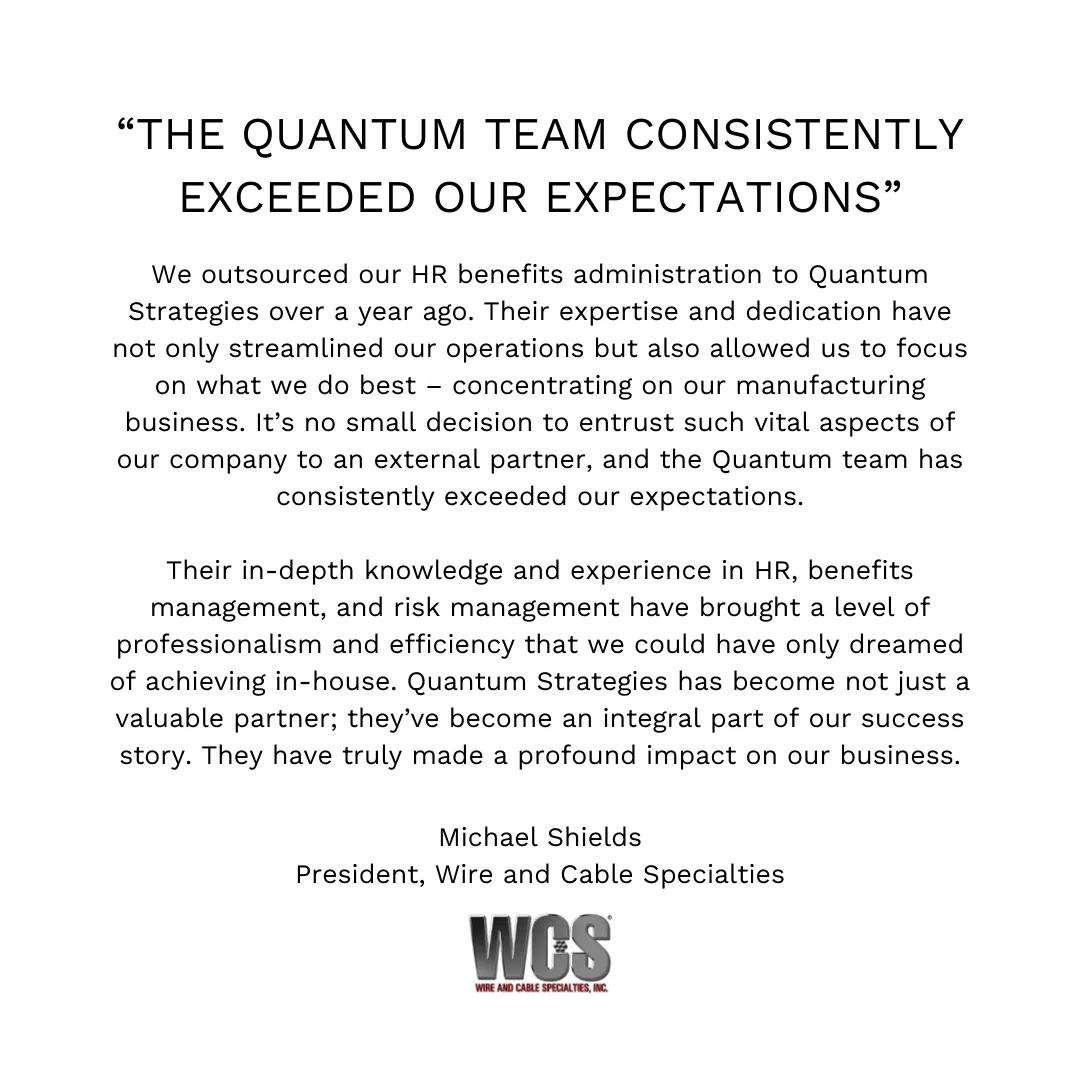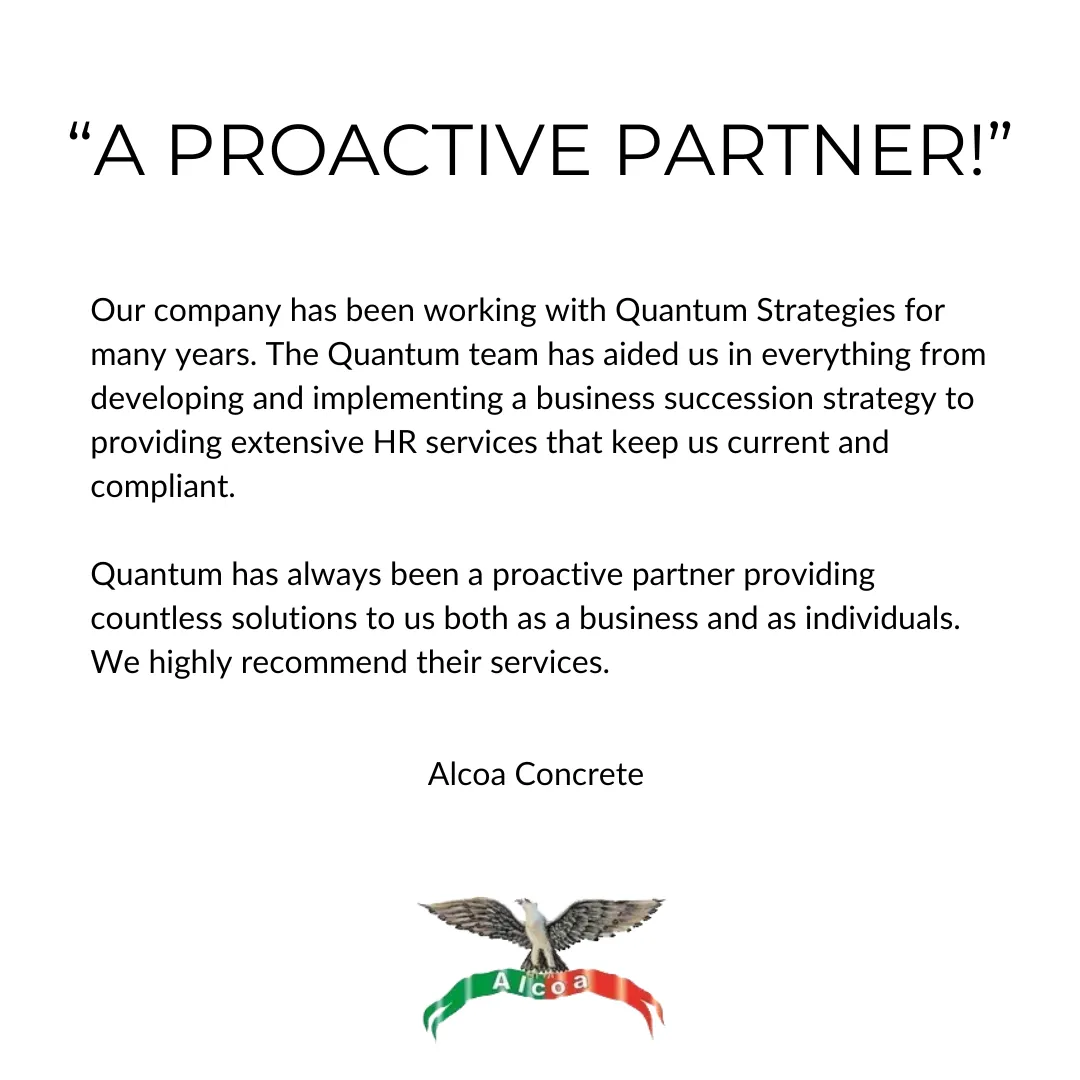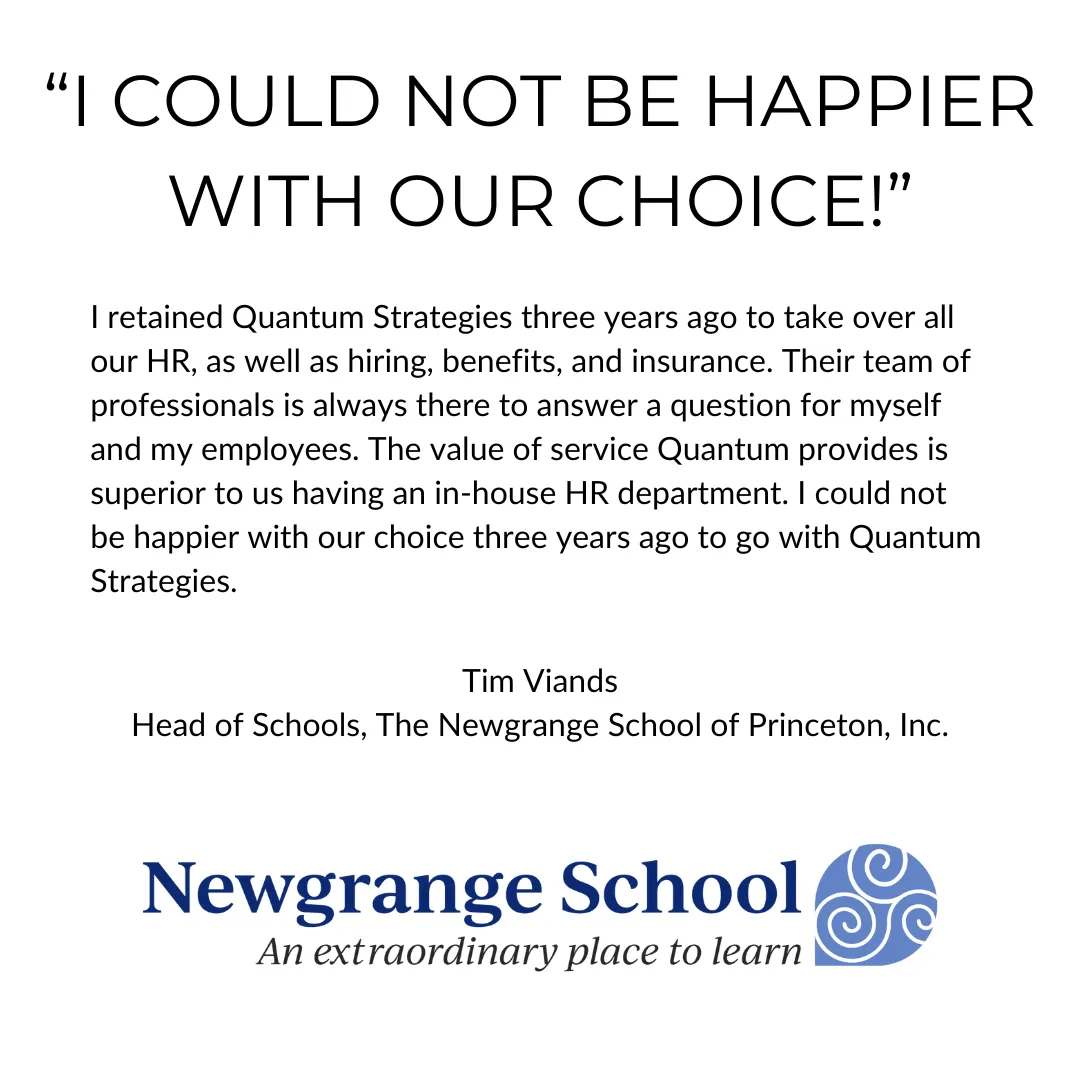Tailored HR Solutions as Unique as Your Business
Expert consulting and service to elevate your HR from a headache to a value driver.
Does Your HR Function Make the Grade?
Take our 5-minute quiz and evaluate the effectiveness of your HR function.

How We Help
We Focus on Your HR Needs,
So You Can Focus on Your Mission.
At Quantum Strategies, we understand that effective human resource management is the cornerstone of every successful business, regardless of size. Our mission is to provide tailored HR solutions that align perfectly with your unique business needs and growth stage.
Our Services
Navigating Change with Confidence: Quantum Expert HR Solutions
From Policy Assistance to Leadership Succession Planning, Quantum Strategies is Your Ultimate HR Resource to Solve Your Business Challenges.
HR Operational
Assessments
Unlock the full potential of your HR department. Our collaborative approach brings clarity and efficiency to your HR operations, providing a thorough analysis of your department's structure, costs, effectiveness, and needs.
Comprehensive Analysis: Detailed evaluation of your organization, workgroups, and individual roles for optimized efficiency.
Objective Insights: Receive a clear blueprint highlighting your HR department's strengths, weaknesses, and gaps.
Strategic Recommendations: Actionable plans focusing on technology utilization, communication enhancement, and leveraging department strengths.
HR Consulting and Managed Services
Tailored to align with your unique needs, our HR consulting and managed services enhance operational efficiency and effectiveness, allowing you to focus on your core mission while we optimize your HR investment.
Expert Supplemental Support: Strengthen your existing HR team with specialized expertise to navigate complex HR landscapes.
Personalized, Agile Solutions: Customized services for organizations with or without HR teams, adaptable to your specific requirements.
Goal-Oriented, Clear Communication: Delivering precise, actionable strategies that align with your organization’s goals and ensure successful execution.
Custom HRIS Design and Integration
Revolutionize your HR data management. Our team will evaluate your current human resources technology stack, offer recommendations, and then integrate your new and existing systems with our cutting-edge technology, ensuring seamless data flow and optimized operational efficiency.
Seamless Integration: Connect legacy systems with modern platforms for streamlined data management.
Tailored Design: Custom HRIS solutions uniquely crafted to meet your specific business needs.
Advanced Analytics: Leverage data-driven insights for strategic decision-making and operational excellence.
“Successfully steering through the specialized HR challenges within organizations of all kinds demands expert understanding, strategic planning, and precise implementation. With comprehensive knowledge of these challenges and the right solutions, your business can stay focused and successful in their vital missions.”
William J. Rizzo

Who we Are.
We Focus on Your HR Needs,
So You Can Focus on Your Mission.
At Quantum Strategies, we recognize that proficient management of human resources is fundamental to the success of any enterprise, irrespective of its scale. Our objective is to deliver customized human resource solutions that are in perfect harmony with your distinct business requirements and developmental phase.
Constant Improvement
Commitment to Customers
High Level Of Knowledge
Best Service You Can Get



Why Choose Us
A True Partner to Solve Your Most Complex HR Challenges.
Empowering HR Innovation and Compliance
Commitment to 100% Client Satisfaction
People-First Approach

Peace of Mind:
Handle ongoing compliance with ease

Employee Satisfaction:
Build a positive workplace with engaged employees

Strategic Confidence:
Drive strategy with advanced analytics

Leadership Development:
Equip your team with the tools to lead

2,245 +
Happy Clients

25 +
Years Of Experience

120 +
Professional Team
Testimonials
The Quantum Commitment - 100% CLIENT SATISFACTION!
At Quantum, we understand that your satisfaction matters most, and The Quantum Commitment is our way of putting that understanding into action. Experience the difference with a team that is dedicated to making your satisfaction the cornerstone of our service. Because when you choose Quantum, you choose excellence, reliability, and a commitment to exceeding your expectations every time.
Our Resources
Unveiling Proven Strategies and Insights.
Discover actionable tips, expert advice, and industry insights to fuel your journey towards success.

Fostering a Psychologically Safe Workspace
As we navigate the complexities of the post-pandemic world, the importance of mental health in the workplace has surged to unprecedented levels. According to research from the
American Psychological Association, 81% of employees are now actively seeking workplaces prioritizing mental well-being.
Key Challenges Faced by Human Resources in Nonprofit Organizations
The nonprofit sector brings its own set of specialized difficulties, especially in the area of human resources (HR). Although these difficulties may share some common ground with those in the for-profit industry, they possess unique characteristics that require special attention from nonprofit leaders.
FOUND THESE HELPFUL?
Explore Additional Articles and Resources In Our Blog

The Key Elements of a Successful HR Transformation
Focus on People
A common theme in a modern HR transformation process, discussed by many business leaders, is a shift in focus from administrative tasks to strategic functions that support and develop employee experience and engagement. This shift has proven to be a game-changer, leading to many benefits for organizations, from improved employee retention to attracting top talent.
Employee experience, for example, improves the turnover rate of existing employees while also attracting top talent. Turnover rate has been a challenge to modern organizations due to today's highly competitive workforce. Improving employee experience makes them value the organization they want to work at and makes them more likely to stay at the organization.
Part of the employee experience is offering hybrid and remote work. With today's competitive workforce, employees often seek a flexible work schedule where they can work from home if they are busy or choose a set number of days to go into the office.
Another way to improve the employee experience is through employee engagement initiatives. These initiatives increase employee retention and have other positive benefits. Employee engagement fosters a robust team environment by encouraging employees to communicate openly with their managers and each other. This makes employees feel a sense of belonging to the organization's overall strategy.
A typical employee engagement initiative is a recognition program where managers formally recognize and reward employees for completing their tasks. This motivates individuals to complete their functions and improve their overall performance. It helps the organization get the most out of its employees while also keeping them happy and making them feel a part of the team.
Leverage Technology
Another modern staple of an effective digital HR transformation strategy is adopting Human Resource Information Technology (HRIS). These systems can integrate an organization's people data to help with data-driven decision-making. It can also streamline HR functions and save time and resources.
HRIS can enhance common elements of modern HR teams with an online platform. This can be a performance management system, succession planning system, onboarding system, learning and development system, etc. The more systems you implement, the more data you will have to use to make decisions.
In addition to HRIS platforms, technology can also be leveraged for automation. Artificial intelligence (AI) has taken over today's more modern business world and is commonly used for HR purposes. Tools like AI chatbot and AI onboarding can eliminate redundant tasks that often waste time. This empowerment of HR professionals allows them to focus on a more strategic HR operating model and tasks, enhancing their efficiency and effectiveness.

Data-driven decision making
As mentioned above, there is more people data than ever right now, and even more so with the inclusion of the data from HRIS. This data is not just valuable; it's a goldmine. With it, an organization can make intelligent, data-driven decisions that can significantly benefit the company, providing a solid foundation for the strategic direction of the HR function.
The data can be used for compensation management by analyzing salary trends and creating benchmarks. It can also be used in essential people analytics with insights to recruit the right candidate, monitor and evaluate performance, and identify potential organizational leaders. You can also use this data to assess your organization internally as a position analyzer. This will help maximize employee efficiency by using statistics to analyze what resources are needed at a specific job position.
Case Studies
Let's look at successful human resources transformations in the real world. These companies used many elements of an HR operating model and transformation to fit their needs.
Company A Overview
Company A realized that its HR department's business priorities were behind the competition. They wanted to adapt to today's changing and more significant business landscape. They aimed to align their HR practices with strategic business goals while improving employee experience.
After assessing their current HR systems, processes, and organizational structure, they identified areas for improvement and began their HR digital transformation or average transformation journey.
Key Strategies Implemented
Company A implemented three primary strategies in its HR transformation roadmap.
The first initiative for Company A was to simplify the HR process. They needed to improve efficiency and wanted to do that through streamlining. First, they automated time-consuming and redundant tasks. Then, they sought to eliminate unnecessary paperwork while digitizing HR operations where needed.
This led to an immediate efficiency improvement. The simplification of company A's HR function allowed it to streamline operations and reduce the administrative burden, freeing up HR professionals to focus on more strategic HR tasks.
The second major initiative of the HR leaders was developing their talent management. After the assessment, Company A realized that it wanted to increase its human resources function by focusing on its in-house talent and stressing the importance of continuous learning and development. To this end, Company A introduced mentoring initiatives, career development frameworks, and online training programs.
This focus on talent development helped upskill and reskill their workforce. In addition, it fundamentally changed the company culture to foster growth and innovation from within. Focusing on an effective talent strategy also led to increased talent retention rates. Supporting employees' professional development made them more likely to stay with the company.

Company B Overview
Company B felt that its technology adoption was behind the competition. It wanted to leverage technology to increase efficiency and modernize its HR vision. In addition, Company B realized the importance of an engaged and healthy workforce, which led it to look for an employee engagement and well-being initiative.
Key Strategies implemented
Company B's first strategy was to leverage HR technology where needed. After identifying its weaknesses in an HR assessment, Company B implemented an integrated HR system. This system enabled self-service options for employees, automated their manual processes, and gave them more data accessibility and accuracy.
HR technology had a profound impact on Company B's HR processes. First, by using HR technology enablement to implement automation, Company B could immediately streamline HR strategies to increase efficiency. Introducing new digital tools and self-service options enhanced the employee experience by giving the employees easy access to information and HR services. In addition, it helped the company improve its data analytics department by giving them more data to work with.
The next strategy was to implement several initiatives to enhance employee engagement and well-being. Company B first implemented a strategy to enhance work-life balance, which allowed them to work remotely and hybrid. They also started promoting mental health to help with employee well-being. Lastly, they established an employee engagement system for employees to communicate and be recognized by managers.
This strategy had many benefits, starting with an increase in retention. Employees liked to feel engaged with other employees in the company, making them more likely to stay. In addition, this improved the overall employee experience. The hybrid work initiative gave employees less stress and more time to focus on their personal lives, and the employee engagement platform made it easier for them to communicate with their teams.
Company C Overview
Company C had over 10,000 employees and already had higher levels of employee engagement than its competitors in the same industry. It was looking for an HR transformation that would maximize its return on investment through data analytics.
Key Strategies Implemented
Company C brought in an HR analytics team to analyze its performance and how it relates to engagement. Using 450 different data points, they determined that for every 1 percent increase in employee engagement, the business would perform at a .4 percent increase. The team also analyzed data from the company's top-performing stores.
By using these data reports, Company C could use a strategy to increase employee engagement further and achieve the desired results. First, after analyzing its top 100 performing stores, Company C was able to create a profile for its best-performing stores. This included the ideal team size for optimal efficiency and the top quality and skills for the most effective management teams.
Company C also realized that underperforming stores needed employees with the skills to succeed. That led the company to implement a learning and development program to reskill and up-skill store management.
Since they realized they could still benefit from increased employee engagement, company C also started to use an employee engagement system for managers to communicate with each other. After all this, the CPO reported positive ongoing results after implementing their initiative. Company C saw an increase in both return on investment and employee engagement when this new role of HR came into play.

Conclusion
Numerous methods can be utilized for a successful digital HR transformation or a true transformation through the entire workplace. It depends on the needs of your business strategy and whether you need a complete organizational change. A successful HR transformation can come in the form of a revamped data analytics department, adopting a relevant and new technology, focusing on the employee experience, or introducing automation and streamlining. The possibilities are endless.
The three companies analyzed above all saw success through a comprehensive HR transformation in their unique ways. However, the common theme is that each company addressed its needs and found a solution that fit them.
If you want a comprehensive HR assessment to maximize the efficiency of your HR function and department, then contact Quantum Strategies today by clicking here.
Connect
Keep Up with Our Latest News and Insights
Subscribe to Quantum Strategies' latest updates and insights.
Office: Philadelphia, PA | Glen Mills, PA | Washington, DC
Call 610.624.1770
Email: info@QS2500.com
Site: www.QS2500.com






